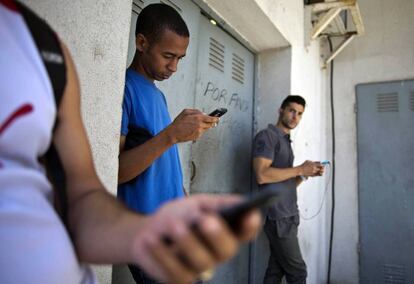Google signs deal to boost internet speeds in Cuba
Agreement will see faster downloads for company’s products but won’t increase overall access rates
In a small step forward for the internet in Cuba, US technology giant Google and Cuba’s state telecommunications provider ETECSA have signed off on a deal that will boost download times for Google products – including Google search and email service Gmail – on the island.

Under the deal signed on November 23 and announced on Tuesday, Cuba will for the first time have access to the Google Global Cache service, which will “cut access times to Google content, providing greater service speed and quality, and optimizing the capacities of the ETECSA network,” the provider said in a statement.
“This deal allows ETECSA to use our technology to reduce latency by caching some of our most popular high bandwidth content like YouTube videos at a local level,” a Google statement said.
Google first began its involvement in Cuba in 2014, just months before US President Barack Obama initiated a thaw in relations between Washington and Havana, launching products including Google Chrome, Google Play and Google Analytics.
Since the beginning of that thaw, which has seen the opening of a US embassy on the island and direct flights with America reestablished, Washington has also been keen to promote the opening up of internet access in a country with one of the lowest penetrations in the world. Trade restrictions have also been loosened to this end.
Home internet is banned in Cuba but some 25o,000 people a day use the country’s 1,066 public access points
But authorities in Cuba say US measures have had little effect as the trade embargo remains in place, making the purchase of both software and IT technology difficult.
In March, Google opened its first technology test center in Cuba. Based at the studio of artist Alexis Leiva (or Kcho) in Havana it allows people to experience the speed of new-generation internet connections, far faster than that seen elsewhere on the island.
In Cuba, home internet access remains banned for now except in the case of professionals such as journalists, lawyers and academics, and even then only with prior government approval.
However, the Cuban government has established hundreds of wireless internet hotspots where people can go online for $2 an hour, a very high amount for most people in a country where government workers take home around $20 to $30 a month. Cuba has 1,066 public internet access points used by 250,000 people a day, according to ETECSA figures from September.
The company is also rolling out a pilot plan to test home internet connection, a project involving Chinese telecoms company Huawei and 2,000 residents in Havana’s old town.
English version by George Mills.
Tu suscripción se está usando en otro dispositivo
¿Quieres añadir otro usuario a tu suscripción?
Si continúas leyendo en este dispositivo, no se podrá leer en el otro.
FlechaTu suscripción se está usando en otro dispositivo y solo puedes acceder a EL PAÍS desde un dispositivo a la vez.
Si quieres compartir tu cuenta, cambia tu suscripción a la modalidad Premium, así podrás añadir otro usuario. Cada uno accederá con su propia cuenta de email, lo que os permitirá personalizar vuestra experiencia en EL PAÍS.
¿Tienes una suscripción de empresa? Accede aquí para contratar más cuentas.
En el caso de no saber quién está usando tu cuenta, te recomendamos cambiar tu contraseña aquí.
Si decides continuar compartiendo tu cuenta, este mensaje se mostrará en tu dispositivo y en el de la otra persona que está usando tu cuenta de forma indefinida, afectando a tu experiencia de lectura. Puedes consultar aquí los términos y condiciones de la suscripción digital.








































